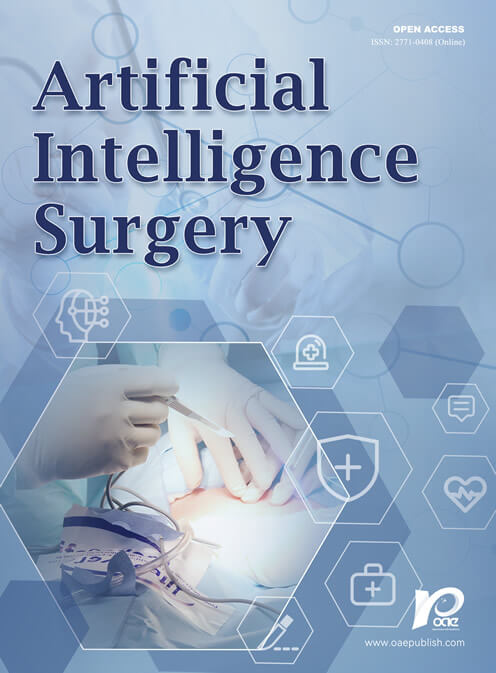REFERENCES
1. Pantelis AG, Stravodimos GK, Lapatsanis DP. A scoping review of artificial intelligence and machine learning in bariatric and metabolic surgery: current status and future perspectives. Obes Surg. 2021;31:4555-63.
2. Bellini V, Valente M, Turetti M, et al. Current applications of artificial intelligence in bariatric surgery. Obes Surg. 2022;32:2717-33.
3. Bektaş M, Reiber BMM, Pereira JC, Burchell GL, van der Peet DL. Artificial intelligence in bariatric surgery: current status and future perspectives. Obes Surg. 2022;32:2772-83.
4. Al-Mazrou AM, Bellorin O, Dakin G, Pomp A, Unruh MA, Afaneh C. Implementation of the Metabolic and Bariatric Surgery Accreditation and Quality Improvement Program and outcomes of bariatric surgery. Am J Surg. 2023;225:362-6.
5. Aminian A, Brethauer SA, Kirwan JP, Kashyap SR, Burguera B, Schauer PR. How safe is metabolic/diabetes surgery? Diabetes Obes Metab. 2015;17:198-201.
6. Eisenberg D, Shikora SA, Aarts E, et al. 2022 American Society of Metabolic and Bariatric Surgery (ASMBS) and International Federation for the Surgery of Obesity and Metabolic Disorders (IFSO) Indications for Metabolic and Bariatric Surgery. Obes Surg. 2023;33:3-14.
7. Page MJ, McKenzie JE, Bossuyt PM, et al. The PRISMA 2020 statement: an updated guideline for reporting systematic reviews. BMJ. 2021;372:n71.
8. Wolff RF, Moons KGM, Riley RD, et al; PROBAST Group. PROBAST: a tool to assess the risk of bias and applicability of prediction model studies. Ann Intern Med. 2019;170:51-8.
9. Moons KGM, Wolff RF, Riley RD, et al. PROBAST: a tool to assess risk of bias and applicability of prediction model studies: explanation and elaboration. Ann Intern Med. 2019;170:W1-33.
10. Çorbacıoğlu ŞK, Aksel G. Receiver operating characteristic curve analysis in diagnostic accuracy studies: a guide to interpreting the area under the curve value. Turk J Emerg Med. 2023;23:195-8.
11. Cao Y, Fang X, Ottosson J, Näslund E, Stenberg E. A comparative study of machine learning algorithms in predicting severe complications after bariatric surgery. J Clin Med. 2019;8:668.
12. Cao Y, Montgomery S, Ottosson J, Näslund E, Stenberg E. Deep learning neural networks to predict serious complications after bariatric surgery: analysis of scandinavian obesity surgery registry data. JMIR Med Inform. 2020;8:e15992.
13. Scott AW, Amateau SK, Leslie DB, Ikramuddin S, Wise ES. Prediction of 30-day morbidity and mortality after conversion of sleeve gastrectomy to Roux-en-Y gastric bypass: use of an artificial neural network. Am Surg. 2024;90:1202-10.
14. Sheikhtaheri A, Orooji A, Pazouki A, Beitollahi M. A clinical decision support system for predicting the early complications of one-anastomosis gastric bypass surgery. Obes Surg. 2019;29:2276-86.
15. Stenberg E, Cao Y, Szabo E, Näslund E, Näslund I, Ottosson J. Risk prediction model for severe postoperative complication in bariatric surgery. Obes Surg. 2018;28:1869-75.
16. Wise ES, Amateau SK, Ikramuddin S, Leslie DB. Prediction of thirty-day morbidity and mortality after laparoscopic sleeve gastrectomy: data from an artificial neural network. Surg Endosc. 2020;34:3590-6.
17. Wise E, Leslie D, Amateau S, et al. Prediction of thirty-day morbidity and mortality after duodenal switch using an artificial neural network. Surg Endosc. 2023;37:1440-8.
18. Zucchini N, Capozzella E, Giuffrè M, et al. Advanced non-linear modeling and explainable artificial intelligence techniques for predicting 30-day complications in bariatric surgery: a single-center study. Obes Surg. 2024;34:3627-38.
19. Butler LR, Chen KA, Hsu J, Kapadia MR, Gomez SM, Farrell TM. Predicting readmission after bariatric surgery using machine learning. Surg Obes Relat Dis. 2023;19:1236-44.
20. Charles-Nelson A, Lazzati A, Katsahian S. Analysis of trajectories of care after bariatric surgery using data mining method and health administrative information systems. Obes Surg. 2020;30:2206-16.
21. Torquati M, Mendis M, Xu H, et al. Using the super learner algorithm to predict risk of 30-day readmission after bariatric surgery in the United States. Surgery. 2022;171:621-7.
22. Zhang M, Chen R, Yang Y, Sun X, Shan X. Machine learning analysis of lab tests to predict bariatric readmissions. Sci Rep. 2024;14:16845.
23. Hsu JL, Chen KA, Butler LR, et al. Application of machine learning to predict postoperative gastrointestinal bleed in bariatric surgery. Surg Endosc. 2023;37:7121-7.
24. Nudel J, Bishara AM, de Geus SWL, et al. Development and validation of machine learning models to predict gastrointestinal leak and venous thromboembolism after weight loss surgery: an analysis of the MBSAQIP database. Surg Endosc. 2021;35:182-91.
25. Ali H, Inayat F, Moond V, et al. Predicting short-term thromboembolic risk following Roux-en-Y gastric bypass using supervised machine learning. World J Gastrointest Surg. 2024;16:1097-108.
26. Dang JT, Switzer N, Delisle M, et al. Predicting venous thromboembolism following laparoscopic bariatric surgery: development of the BariClot tool using the MBSAQIP database. Surg Endosc. 2019;33:821-31.
27. Cruz MR, Martins C, Dias J, Pinto JS. A validation of an intelligent decision-making support system for the nutrition diagnosis of bariatric surgery patients. JMIR Med Inform. 2014;2:e8.
28. Lenér F, Höskuldsdóttir G, Landin-Wilhelmsen K, et al. Anaemia in patients with self-reported use of iron supplements in the BAriatric surgery SUbstitution and nutrition study: a prospective cohort study. Nutr Metab Cardiovasc Dis. 2023;33:998-1006.
29. Pan Y, Du R, Han X, et al. machine learning prediction of iron deficiency anemia in Chinese premenopausal women 12 months after sleeve gastrectomy. Nutrients. 2023;15:3385.
30. Parrott JM, Parrott AJ, Rouhi AD, Parrott JS, Dumon KR. What we are missing: using machine learning models to predict vitamin C deficiency in patients with metabolic and bariatric surgery. Obes Surg. 2023;33:1710-9.
31. Emile SH, Ghareeb W, Elfeki H, El Sorogy M, Fouad A, Elrefai M. Development and validation of an artificial intelligence-based model to predict gastroesophageal reflux disease after sleeve gastrectomy. Obes Surg. 2022;32:2537-47.
32. Liew PL, Lee YC, Lin YC, et al. Comparison of artificial neural networks with logistic regression in prediction of gallbladder disease among obese patients. Dig Liver Dis. 2007;39:356-62.
33. Romero-Velez G, Dang J, Barajas-Gamboa JS, et al. Machine learning prediction of major adverse cardiac events after elective bariatric surgery. Surg Endosc. 2024;38:319-26.
34. McCormack R, Michels R, Ramos N, Hutzler L, Slover JD, Bosco JA. Thirty-day readmission rates as a measure of quality: causes of readmission after orthopedic surgeries and accuracy of administrative data. J Healthc Manag. 2013;58:64-76; discussion 76.
35. Wilson MP, Jack AS, Nataraj A, Chow M. Thirty-day readmission rate as a surrogate marker for quality of care in neurosurgical patients: a single-center Canadian experience. J Neurosurg. 2019;130:1692-8.
36. Kollmann L, Gruber M, Lock JF, Germer CT, Seyfried F. Clinical management of major postoperative bleeding after bariatric surgery. Obes Surg. 2024;34:751-9.
37. Firkins SA, Simons-Linares R. Management of leakage and fistulas after bariatric surgery. Best Pract Res Clin Gastroenterol. 2024;70:101926.
38. El Ansari W, El-Menyar A, El-Ansari K, Al-Ansari A, Lock M. Cumulative incidence of venous thromboembolic events in-hospital, and at 1, 3, 6, and 12 months after metabolic and bariatric surgery: systematic review of 87 studies and meta-analysis of 2,731,797 patients. Obes Surg. 2024;34:2154-76.
39. Gomes R, Costa-Pinho A, Ramalho-Vasconcelos F, et al. Portomesenteric venous thrombosis after bariatric surgery: a case series and systematic review comparing LSG and LRYGB. J Pers Med. 2024;14:722.
40. Lupoli R, Lembo E, Saldalamacchia G, Avola CK, Angrisani L, Capaldo B. Bariatric surgery and long-term nutritional issues. World J Diabetes. 2017;8:464-74.
41. Serra FE, Cohen RV. Gastroesophageal reflux disease after sleeve gastrectomy. Dig Med Res. 2024;7.
42. Tsirline VB, Keilani ZM, El Djouzi S, et al. How frequently and when do patients undergo cholecystectomy after bariatric surgery? Surg Obes Relat Dis. 2014;10:313-21.
43. Tustumi F, Bernardo WM, Santo MA, Cecconello I. Cholecystectomy in patients submitted to bariatric procedure: a systematic review and meta-analysis. Obes Surg. 2018;28:3312-20.
44. Khorgami Z, Jackson TN, Aminian A, Sahawneh JM, Sclabas GM, Chow GS. Early cardiac complications after bariatric surgery: does the type of procedure matter? Surg Obes Relat Dis. 2019;15:1132-7.
45. Luo W, Phung D, Tran T, et al. Guidelines for developing and reporting machine learning predictive models in biomedical research: a multidisciplinary view. J Med Internet Res. 2016;18:e323.
46. Aliferis C, Simon G. Overfitting, underfitting and general model overconfidence and under-performance pitfalls and best practices in machine learning and AI. In: Simon GJ, Aliferis C, editors. Artificial intelligence and machine learning in health care and medical sciences. Cham: Springer International Publishing; 2024. pp. 477-524.
47. Kiremitci S, Seven G, Silahtaroglu G, Kochan K, Degirmencioglu Tosun S, Senturk H. The role of artificial intelligence and deep learning in determining the histopathological grade of pancreatic neuroendocrine tumors by using EUS images. Endosc Ultrasound. 2025;14:48-56.
48. Razzaghi T, Safro I, Ewing J, Sadrfaridpour E, Scott JD. Predictive models for bariatric surgery risks with imbalanced medical datasets. Ann Oper Res. 2019;280:1-18.
49. Xue B, Li D, Lu C, et al. Use of machine learning to develop and evaluate models using preoperative and intraoperative data to identify risks of postoperative complications. JAMA Netw Open. 2021;4:e212240.
50. Stam WT, Goedknegt LK, Ingwersen EW, Schoonmade LJ, Bruns ERJ, Daams F. The prediction of surgical complications using artificial intelligence in patients undergoing major abdominal surgery: a systematic review. Surgery. 2022;171:1014-21.
51. Henn J, Buness A, Schmid M, Kalff JC, Matthaei H. Machine learning to guide clinical decision-making in abdominal surgery-a systematic literature review. Langenbecks Arch Surg. 2022;407:51-61.
52. Ravenel M, Joliat GR, Demartines N, Uldry E, Melloul E, Labgaa I. Machine learning to predict postoperative complications after digestive surgery: a scoping review. Br J Surg. 2023;110:1646-9.
53. Wang J, Tozzi F, Ashraf Ganjouei A, et al. Machine learning improves prediction of postoperative outcomes after gastrointestinal surgery: a systematic review and meta-analysis. J Gastrointest Surg. 2024;28:956-65.
54. Nopour R. Comparison of machine learning models to predict complications of bariatric surgery: a systematic review. Health Informatics J. 2024;30:14604582241285794.
55. Hassan Mukhtar MA, Babiker Ahmed AU, Siddig Mohammed MA, Ibrahim Omer NO, Altom DS, Elnour MAA. The role of artificial intelligence in the prediction of bariatric surgery complications: a systematic review. Cureus. 2025;17:e82461.
56. Abu-Abeid A, Dvir N, Lessing Y, et al. Primary versus revisional bariatric and metabolic surgery in patients with a body mass index ≥ 50 kg/m2-90-day outcomes and risk of perioperative mortality. Obes Surg. 2024;34:2872-9.
57. Giannopoulos S, Li WS, Kalantar Motamedi SM, Embry M, Stefanidis D. Outcome comparison between primary and revisional bariatric surgery: a propensity-matched analysis. Surgery. 2024;175:592-8.
58. Saux P, Bauvin P, Raverdy V, et al. Development and validation of an interpretable machine learning-based calculator for predicting 5-year weight trajectories after bariatric surgery: a multinational retrospective cohort SOPHIA study. Lancet Digit Health. 2023;5:e692-702.
59. Lee GH, Shin SY. Federated learning on clinical benchmark data: performance assessment. J Med Internet Res. 2020;22:e20891.
60. Fathima AS, Basha SM, Ahmed ST, et al. Federated learning based futuristic biomedical big-data analysis and standardization. PLoS One. 2023;18:e0291631.









